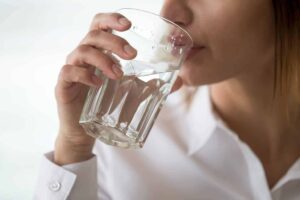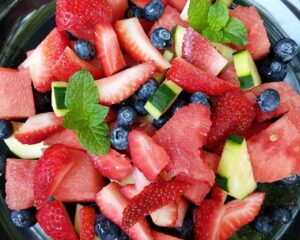If you weren’t aware of it already, your hydration levels have a direct correlation to oral health. With our bodies being at least 60% water, maintaining the right balance of hydration levels are necessary for us as humans to function properly because our system depends on strong hydration. This is also the same for your oral health.
A lack of hydration indicates a sign of low saliva production. Saliva moistens the mouth to improve comfort, lubricate the mouth as you eat and neutralizes harmful bacteria and acid build-up. Saliva also helps to prevent oral health conditions such as halitosis, cavities and tooth decay whilst strengthening your enamel.
The uncomfortable feeling inside the mouth is a sign that your hydration level isn’t as strong as required, and this introduces the opportunity for toxins in the mouth to multiply and cause dry mouth.
No panic, there are many ways to increase your hydration levels, and we’ve picked five of the most effective.

Water
Water is the main source of hydration, and everybody knows that. Drink it when you wake up, throughout the day, when you eat and even before you go to sleep. Staying hydrated is a daily responsibility, and the uncomfort feeling in your mouth will likely force you to hydrate yourself. Water contains no added sugar or calories and is the healthiest form of hydration.
Crunchy Plant-Based Foods
Plant-based foods such as fruit and vegetables comprise at least 80% water and are the perfect hydration snack. It is important that you replace any processed foods with more fruit and vegetables to keep your salivary glands moist. Fruit and vegetables such as berries, melons, grapes, carrots, lettuce and spinach are all great sources of saliva. Don’t forget, plant-based foods also contain the appropriate nutrients for stronger teeth and gums.
Be Aware of The Dehydration Signs
Dry mouth is one of the signs to look out for to determine your hydration levels. Although, there are other signs too. First, pay attention to the colour of your urine. If the colour is dark colour, this means your water intake is low and that you’re dehydrated. The urine colour should stay pale, which indicates high hydration levels. Other signs are headaches, fatigue, muscle cramping and changes in the skin.
Low Fat Milk
Milk also contains excellent hydrating properties, with high concentrations of electrolytes to balance water levels in your body. Low-fat milk helps to rehydrate but also provides essential proteins and other nutrients for stronger teeth and gums.

Drop Alcohol
Unfortunately, alcohol damages oral health and reduces hydration levels. This is because it causes your body to reduce fluids in the blood and your internal organs at a faster rate. You may consume an alcoholic beverage with water, but reduce your alcohol intake because this also contributes to dry mouth.
Your body will function better when it’s hydrated. In regards to your oral health, you want to think about how strong hydration levels can protect your teeth and gums, and this does stem from the food, drink and lifestyle choices. Water is the best source of hydration, but if you’re bored with water, there are some healthy fruit and vegetable and dairy choices for you to enjoy to keep your smile strong.
Are you suffering from dry mouth? Let our experienced dentists help at Parkdale Family Dental and give you all of the advice you need. Click here to contact us today!